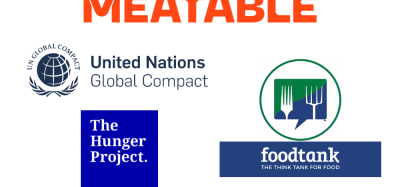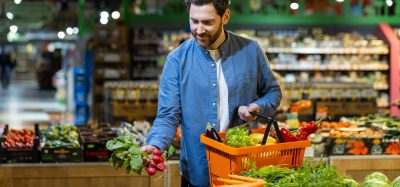The Hershey Company’s commitment to cocoa sustainability
- Like
- Digg
- Del
- Tumblr
- VKontakte
- Buffer
- Love This
- Odnoklassniki
- Meneame
- Blogger
- Amazon
- Yahoo Mail
- Gmail
- AOL
- Newsvine
- HackerNews
- Evernote
- MySpace
- Mail.ru
- Viadeo
- Line
- Comments
- Yummly
- SMS
- Viber
- Telegram
- Subscribe
- Skype
- Facebook Messenger
- Kakao
- LiveJournal
- Yammer
- Edgar
- Fintel
- Mix
- Instapaper
- Copy Link
Posted: 3 July 2012 | Andy McCormick, Vice President Public Affairs, The Hershey Company | No comments yet
The Hershey Company, famous for its chocolate bars, Hershey Kisses and Reese’s Peanut Butter cups, is actively engaged in a broad range of sustainability initiatives that are making a difference in the livelihoods of cocoa communities across West Africa. In fact, the company’s support for cocoa communities goes back more than 50 years.
During the past decade, The Hershey Company and its public and private partners have invested in developing new agricultural practices that are helping West African farmers double the yield on their cocoa farms, which in turn increases their families’ incomes.
In early 2012, Hershey announced plans to expand and accelerate programs to improve cocoa communities by investing USD 10 million in West Africa over the next five years. The USD 10 million commitment builds on the company’s cocoa expertise and partnerships and focuses on increasing the income of the region’s two million cocoa farmers to ensure long-term cocoa sustainability for the region and for Hershey’s global product line. During the past decade, Hershey has created, supported or funded programs that help the cocoa comm – unities develop more productive agriculture practices, build educational and community resources, and improve labour practices.
The Hershey Company, famous for its chocolate bars, Hershey Kisses and Reese’s Peanut Butter cups, is actively engaged in a broad range of sustainability initiatives that are making a difference in the livelihoods of cocoa communities across West Africa. In fact, the company’s support for cocoa communities goes back more than 50 years. During the past decade, The Hershey Company and its public and private partners have invested in developing new agricultural practices that are helping West African farmers double the yield on their cocoa farms, which in turn increases their families’ incomes. In early 2012, Hershey announced plans to expand and accelerate programs to improve cocoa communities by investing USD 10 million in West Africa over the next five years. The USD 10 million commitment builds on the company’s cocoa expertise and partnerships and focuses on increasing the income of the region’s two million cocoa farmers to ensure long-term cocoa sustainability for the region and for Hershey’s global product line. During the past decade, Hershey has created, supported or funded programs that help the cocoa comm - unities develop more productive agriculture practices, build educational and community resources, and improve labour practices.
The Hershey Company, famous for its chocolate bars, Hershey Kisses and Reese’s Peanut Butter cups, is actively engaged in a broad range of sustainability initiatives that are making a difference in the livelihoods of cocoa communities across West Africa. In fact, the company’s support for cocoa communities goes back more than 50 years.
During the past decade, The Hershey Company and its public and private partners have invested in developing new agricultural practices that are helping West African farmers double the yield on their cocoa farms, which in turn increases their families’ incomes.
In early 2012, Hershey announced plans to expand and accelerate programs to improve cocoa communities by investing USD 10 million in West Africa over the next five years. The USD 10 million commitment builds on the company’s cocoa expertise and partnerships and focuses on increasing the income of the region’s two million cocoa farmers to ensure long-term cocoa sustainability for the region and for Hershey’s global product line. During the past decade, Hershey has created, supported or funded programs that help the cocoa comm – unities develop more productive agriculture practices, build educational and community resources, and improve labour practices.
By 2017, Hershey’s public and private partnerships are estimated to directly benefit 750,000 African cocoa farmers and over two million people in cocoa communities across West Africa.
CocoaLink leverages technology to help thousands of farmers
In 2011, Hershey introduced an innovative mobile phone program in Ghana known as CocoaLink. Through CocoaLink, thousands of cocoa farmers are receiving text and voice messages that enable them to improve farming practices, understand issues related to pests and adverse weather conditions, improve labour practices and ask questions of cocoa experts in real-time. CocoaLink represents a first-of-its-kind partnership program developed with World Cocoa Foundation (WCF) and the Ghana Cocoa Board (COCOBOD).
Since its launch, CocoaLink community trainers have already enrolled more than 2,500 farmers, putting the program on track to directly reach more than 8,000 Ghanaian cocoa farmers and community members by next year. Hershey and its partners are committed to reaching 100,000 Ghana cocoa farmers by 2014.
Based on the success of the company’s CocoaLink mobile phone project in Ghana, Hershey announced in early 2012 that it will expand the network into the Ivory Coast this year. The Ivory Coast has approximately 600,000 cocoa farmers and industry data indicates that about half are already using mobile phones.
CocoaLink’s early participants have expressed enthusiasm for the program’s potential to improve their livelihoods.
“I have registered with my husband’s phone number and when I get the message, my children can help me read it out. When I have a problem on the farm I can text or call for help and they will come to help me. I’m expecting that it will help us in the community,” said farmer Vida Annoh, Kojokrom, Sefwi Akontonbra District.
“I know that CocoaLink will add more improvement to my life as a farmer,” added Aseadu Kwarteng, a farmer in Asanteman, Sefwi Akontonbra District. “I have registered and so have other community members. My prayer is that the program will stay with us here in the communities.”
Certified Hershey’s Bliss® chocolates
Later this year, Hershey’s will begin using 100 per cent certified cocoa to make its Hershey’s Bliss® chocolates. Before year-end, US consumers will be able to purchase certified Bliss products made with cocoa from Rainforest Alliance Certified farms. Rainforest Alliance Certified farms have met comprehensive sustainability standards that protect the environment and ensure the safety and well-being of workers, their families and communities.
In addition, Hershey is working with the Rainforest Alliance to source cocoa from certified farms in Latin America and Africa for Hershey’s premium brand, Dagoba®.
Rainforest Alliance inspectors monitor and audit practices on farms supplying certified beans to Hershey to look for instances of unsafe or inappropriate child labour. The Rainforest Alliance also uses training programs to reduce child labour and increase school attendance.
Hershey and the Rainforest Alliance are collaborating to help cocoa farmers prepare for the future by providing with training to help them address global climate change and adapt to its impacts.
HERSHEY LEARN TO GROW farm program
Improved farming practices directly enhance family, community and education in cocoa villages. For example, supplying farmers with high-yielding seedlings, better planting and pruning practices, organic fertilisation and biocontrol of insect pests are all tech – nologies that are embraced in Ghana’s cocoa region. More than 50 per cent of farm family income in this region comes from cocoa, so every extra pound of cocoa is extra cash for the family budget.
For these reasons, Hershey has partnered with Source Trust to introduce the HERSHEY LEARN TO GROW farm and community learning training centre in 2012. Source Trust is a nonprofit organisation set up to help farmers improve their livelihoods through better crop yields and quality, achieved through sustainable farming practices.
Hershey has selected The Assin Foso District in the heart of Ghana’s central cocoa region as the site for the innovative HERSHEY LEARN TO GROW centre. From this location, the program will help more than 1,000 farm families and 5,000 cocoa community members improve their livelihoods by learning the latest in modern farming techniques and agricultural steward – ship, including appropriate and inappropriate uses of labour.
HERSHEY LEARN TO GROW also has introduced an innovative program that will use GPS mapping to provide precise measurements of farm acreage so that farmers can better plan and manage their cocoa farms, increasing yields and farmer incomes.
Through HERSHEY LEARN TO GROW, Hershey and Source Trust are:
- Establishing 25 community-based farmer organisations to improve the living standards of 1,250 cocoa farm families through good agricultural, environmental, social and business practices training, access to improved planting material and finance for farm inputs with the goal to double productivity yield and farm income over four years
- Assisting the Government of Ghana to meet the goals of Ghana’s 2009-2015 National Plan of Action for the Elimination of the Worst Forms of Child Labour (WFCL)
- Bringing high-tech learning to rural farm villages through technology centres that can be used by schools, farmers and the wider community. HERSHEY LEARN TO GROW programs will be based on inter – active curriculum to train cocoa farmers on good agricultural, environmental and social practices
By accelerating its cocoa programs in West Africa over the next five years, Hershey believes the company and the industry can achieve significant progress in helping farmers, improving social conditions and creating long-term cocoa sustainability. Hershey will regularly update its progress on these programs through its Corporate Social Responsibility public reporting.
Other highlights of Hershey’s cocoa sustainability efforts include:
- CocoaLink recently became one of the first company programs to be endorsed by the US Department of Labor as part of its USD 17 million Framework of Action to combat the worst forms of child labour in Ghana and the Ivory Coast. The Hershey Company is a founding partner and a sponsor of the Framework of Action
- Hershey is a founding member of a publicprivate partnership involving the global cocoa and chocolate industry and the US Department of Labor. The partnership has created a new Framework of Action to significantly reduce the worst forms of child labour in Ghana and the Ivory Coast by 2020
- Hershey is a member of AIM-PROGRESS, a group of 30 global companies that works to maintain common responsible sourcing standards through fair labour standards, health and safety, environmental manage – ment, and business integrity
During the past decade, The Hershey Company and its industry partners have funded programs to develop healthy, sustainable farms and communities, improve financial returns for cocoa growing farms and comm – unities, develop effective farmer support organisations, promote sound, productive farming practices, engage in environmental stewardship efforts and establish farm schools based in cocoa fields and vocational training opportunities for underserved rural youth in cocoa-growing regions.
Most important, these efforts to sustain the cocoa crop are helping to sustain the cocoa community and the farmers and families who call West Africa home.
About the author
Andy McCormick is Vice President, Public Affairs, for The Hershey Company. In this role, McCormick is responsible for leading Hershey’s Communications, Public Relations and Corporate Social Responsibility teams. McCormick’s key responsibilities include external and internal communications, and the development and implementation of a global framework for social responsibility and sustainability, including responsible cocoa growing.
McCormick joined Hershey from Pfizer Inc., where he was Vice President, Worldwide Communications. Before joining Pfizer, he held positions at IBM Corporation and at daily newspapers in Virginia and Wilmington, Del. He has also worked in Ghana as a US Peace Corps volunteer. McCormick serves on the boards of the World Cocoa Foundation, the International Cocoa Initiative, and United Way of Lancaster County. McCormick holds a bachelor’s degree from Evergreen State College in Olympia, Washington.









